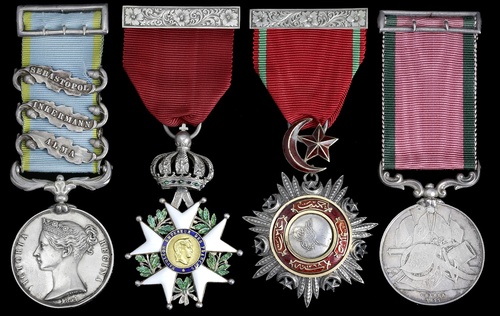
Auction: 19001 - Orders, Decorations and Medals
Lot: 369
(x) A notable 'Great Redoubt stormer's' group of four to Lieutenant-General Edward Westby Donovan, 33rd Foot, credited with capturing a 24-pound brass howitzer at the Battle of the Alma on 20 September 1854; for performing a similar feat, Captain Bell of the 23rd Foot received the Victoria Cross.
Donovan was severely wounded in the trenches before Sebastopol, his 'zealous service' praised in Lord Raglan's despatches.
Crimea 1854-56, 3 clasps, Alma, Inkermann, Sebastopol (Major E. W. Donovan. 33rd Regt.), officially engraved by Hunt & Roskell in large serif capitals; France, Second Empire, Legion of Honour, 5th Class breast Badge, silver, gold centre and enamel; Turkey, Ottoman Empire, Order of the Medjidie, 5th Class breast Badge, silver, gold and enamel; Turkish Crimea, British issue, replacement scroll suspension, all fitted with silver top riband buckles, very fine (4)
Legion of Honour London Gazette 4 August 1856.
Order of the Medjidie London Gazette 2 March 1858.
Edward Westby Donovan was born on 6 September 1821, scion of the distinguished Ballymore branch of the O'Donovans of Clan Loughlin. He was commissioned as an Ensign into the 33rd (West Riding) Regiment of Foot, without purchase, on 10 January 1840. He advanced to Lieutenant on 14 June 1842 and Captain on 22 December 1848. Owing to the Regiment's proud links with Wellington, the title 'The Duke of Wellington's Regiment' was granted on 18 June 1853.
Donovan served with the 33rd in the Crimean War, playing a conspicuous role at the Alma on 20 September 1854. Part of Sir George Brown's Light Division, the 33rd scaled the south bank of the river under galling fire, capturing the Great Redoubt. Some weeks earlier, the Tsar expressly decreed that no Russian gun was to fall into enemy hands (Pemberton 1962, 48). As a result, the gunners in the Great Redoubt frantically limbered up as the British infantry drew near. In the case of a brass 24-pound howitzer, they left it too late. According to Regimental tradition, Donovan was the first to scratch his name onto the captured piece. Captain Bell of the 23rd Foot was awarded the Victoria Cross for capturing a Russian gun during the same action, in similar circumstances (see Carter 1861, 16). Like the 23rd Foot on their left flank, the 33rd were thrown into confusion by the Vladimir Regiment's counter-attack, suffering casualties of 1 officer and 55 other ranks killed, 6 officers and 177 other ranks wounded (Hope 2003, 115).
Donovan was present at Inkermann on 5 November. Severely wounded in the trenches before Sebastopol on 15 April 1855, he was singled out for praise in Lord Raglan's despatch two days later for having 'most zealously served from the commencement of the campaign' (London Gazette, 2 May 1855). He was evacuated home on 19 April. Promotion to Major followed on 17 July, and he was awarded the 5th Class of the Legion of Honour and of the Medjidie.
Donovan rose to become Colonel of his Regiment on 31 January 1863, and on 28 October advanced to Major-General. On 18 June 1881 he was appointed to command all land forces in China and the Straits Settlements. He retired from the Army on 1 April 1887, with the honorary rank of General, and died ten years later; sold with a file of copied research.
Reference works:
Carter, T., Medals of the British Army, and How They Were Won, Vol. I - Crimea (London, 1861).
Hope, R., A Staffordshire Regiment in the Crimea: 38th Regiment of Foot (Leek, 2003).
Pemberton, B. P., Battles of the Crimean War (London, 1962).
Subject to 5% tax on Hammer Price in addition to 20% VAT on Buyer’s Premium. For more information please view Terms and Conditions for Buyers.
Sold for
£1,800




